The theme of International Women’s Day this year was #ChooseToChallenge. Here in FMS, we believe strongly in challenging gendered assumptions on working in science. It’s important to celebrate the hard working & powerful women leading our department, who set an example every day of just how much women are capable of. To all fellow women scientists out there: remember to celebrate yourselves everyday!
The second interview in our #ChooseToChallenge series is with Catherine Exley, Dean of NU Population Health Sciences Institute. Enjoy!

Please describe your role.
I am Dean of NU Population Health Sciences Institute, one of the three new Institutes formed in November 2019 as a result of the Good to Great faculty reorganisation. My role means I am responsible for an institute which comprises 236 colleagues and 165 postgraduate researcher students. We are a multidisciplinary community comprising colleagues from a range of clinical and academic disciplines who contribute to learning and teaching across all schools in FMS as well as leading and collaborating on a diverse body of research. In addition to my head of academic unit role, I am also responsible for the faculty’s Engagement and Place portfolio, and work closely with Tom Scharf, Katharine Rogers and Charlie Wilkinson and the broader university engagement team to ensure that the brilliant work we do in FMS is captured and celebrated. Finally, I also chair the University’s Health and Well-Being committee; this a real privilege to chair and the committee has been active throughout the pandemic providing support and guidance.
What would a normal day look like for you?
This is a difficult question to answer at this point, and even when I was on campus every day, I don’t think there was a ‘normal’ day. I tend to get up about 6-6.30 during the working week, I read the BBC news, switch on the radio and check my email and diary for the day. We have recently (like many families!) bought a puppy, so our day now starts with walking her on the beach. In addition, the morning routine involves ensuring my son is up and ready for school (early mornings aren’t his thing!), probably throwing a load of washing in the machine and thinking about what everyone is going to eat throughout the day!
The great thing about my role is that each day is so varied, bringing its own joy and problems. The one thing that is pretty consistent is that I have a lot of meetings and receive a lot of emails. With my ‘Dean hat’ on, the meetings I attend can be university, faculty or institute level or 1:1 with colleagues. I work particularly closely with our Institute Operations team which comprises both PS and academic colleagues who have worked really hard ‘behind the scenes’ to keep our institute working in these challenging times. I also have regular catch ups with our Executive who lead a number of our faculty research themes as well as meeting with our EDI and DELT and PGRSC. With my ‘Cath hat’ on I continue to be involved in both research and teaching, in particular I have a number of postgraduate students I supervise, which remains one of the best things about my job. It really is a privilege to work with these colleagues and (hopefully) support them in their academic journey to achieve their PhDs. I am also involved with a number of mentoring schemes across the faculty and university and have regular catch-up with those colleagues too.
The other thing that is consistent and normal in any day is that I walk as much as I can. I live by the coast and I love walking by the sea. This is my ‘head space’ and time for me whether that’s clearing my head over lunch time, or at the end of a day of Zooms. In the last six months, I have tried to consciously switch off from work email in the evening. I’ve even moved the app on my phone so I can’t accidently access it! I am not an owl, so after some food and a bit of television to wind down (often a food-based programme) it’s off to bed for me usually by 10.30.
How have you found a balance between work and homelife during Covid?
When you’re asked a question like this, it’s really hard to answer as I know that I have not had the challenges many people have had during this time. As I have worked from home the odd day for many years, I am I am very fortunate that I was able to adjust relatively easily to working at home.
I live with my husband and (nearly) 15 year old son, and latterly our 5 month old puppy! During the last year we have all been at home for quite a lot of the time, apart from when the schools were open to non-essential workers. By and large we have rubbed along OK. My husband has found lockdowns much easier than me as he is happy with his spreadsheets! I miss people. I miss social contact. I miss the informality of just bumping into colleagues and being able to ‘check things out’ rather than have to schedule a formal meeting. Home schooling is nowhere near the challenge for me has it has been for many of my colleagues who have younger children at home. But I still worry about the short and long-term impacts of all of this on my son (and indeed all children and young people). What has been hard is the ‘blurred boundaries’ between home and work. When I go into the campus I focus entirely on my work and have a much higher level of concentration. At home, even though we are a small family there are always additional things to think about, washing to do, meals to think about, or questions to respond to. I think working in this way for a prolonged period has been really tiring and draining for all of us Hopefully by the time we are celebrating IWD2021 many more children will be returning to the classroom!
What does it mean to you being a woman in your role?
Again, this is a hard question to answer. I never set out with a career plan to be an academic, let alone have any kind of leadership role. I am the eldest of three girls and the first person in my family to go to university. My father is a farmer and my mother a teacher, both of them are retired now. Whilst neither of them would see themselves as feminists, growing up I never had any sense that I couldn’t achieve whatever I wanted to (although I had no idea what that meant!).
At school I had planned to do a law degree, but actually went to university and started a degree in social sciences, before transferring to single honours Sociology. As an undergraduate I was inspired by one of my tutors who was living through breast cancer treatment, and focussed my dissertation on looking at hers, and other women’s experiences, of health and health care and how these were shaped by gender. I never planned to do a PhD, but was fortunate to be awarded some internal funding to cover my fees and a partial stipend which I supplemented with teaching. Women were a big part of my PhD as I interviewed younger people receiving care at a local hospice about their experiences of living with a terminal condition. In the mid 1990s many of those I interviewed were women with advanced breast and ovarian cancer. Nearly 25 years later those women and their stories stay with me, and I remain grateful to them all for giving up their very precious time to speak to a naïve researcher.
In 2003, I moved to Newcastle as a Lecturer and since this time I have been fortunate to work with many inspirational colleagues, both women and men, who have supported and encouraged me throughout my career. I try to emulate what I have learnt from many of those brilliant colleagues, mentors and friends. I hope I am open and honest. I don’t always get things right and like everyone there are times when I wake at night worrying about things. However, being an academic is just one part of my world and whilst I may not be the best at any one thing and make mistakes, I am proud of what I have achieved thus far as a daughter, sister, partner, friend, mum and academic.
A huge thank you to Catherine for taking the time to talk to us.
Newcastle University is committed to developing careers for all colleagues, with some great success stories of women who have developed full and rewarding careers across the institution. Historically we have supported specific women into leadership programmes such as the Aurora programme and the Women in academia – coaching and mentoring (WiCAM) programme in collaboration with Durham University, alongside broader coaching and mentoring opportunities. As part of the university commitment to this agenda, work is currently underway to review our development offerings with a view to launching a refreshed offer in the autumn to ensure we have the right support in place.





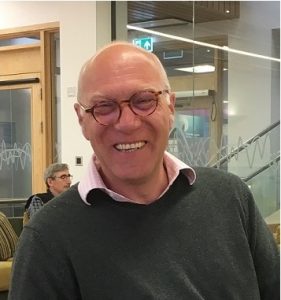
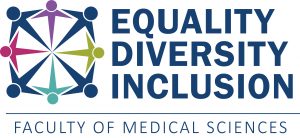 What has been your favourite thing about the role so far?
What has been your favourite thing about the role so far?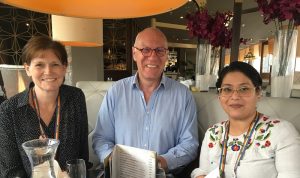

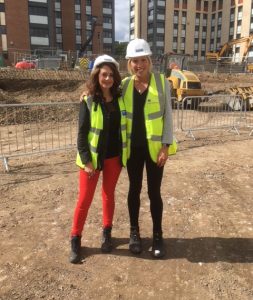
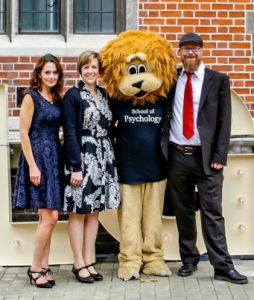
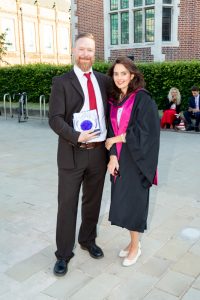 What advice would you give to your successor?
What advice would you give to your successor?